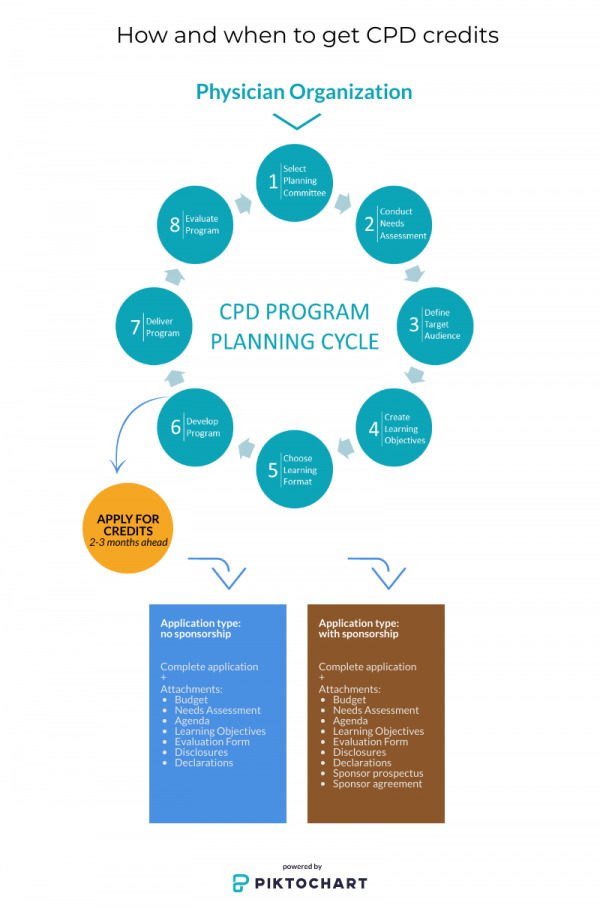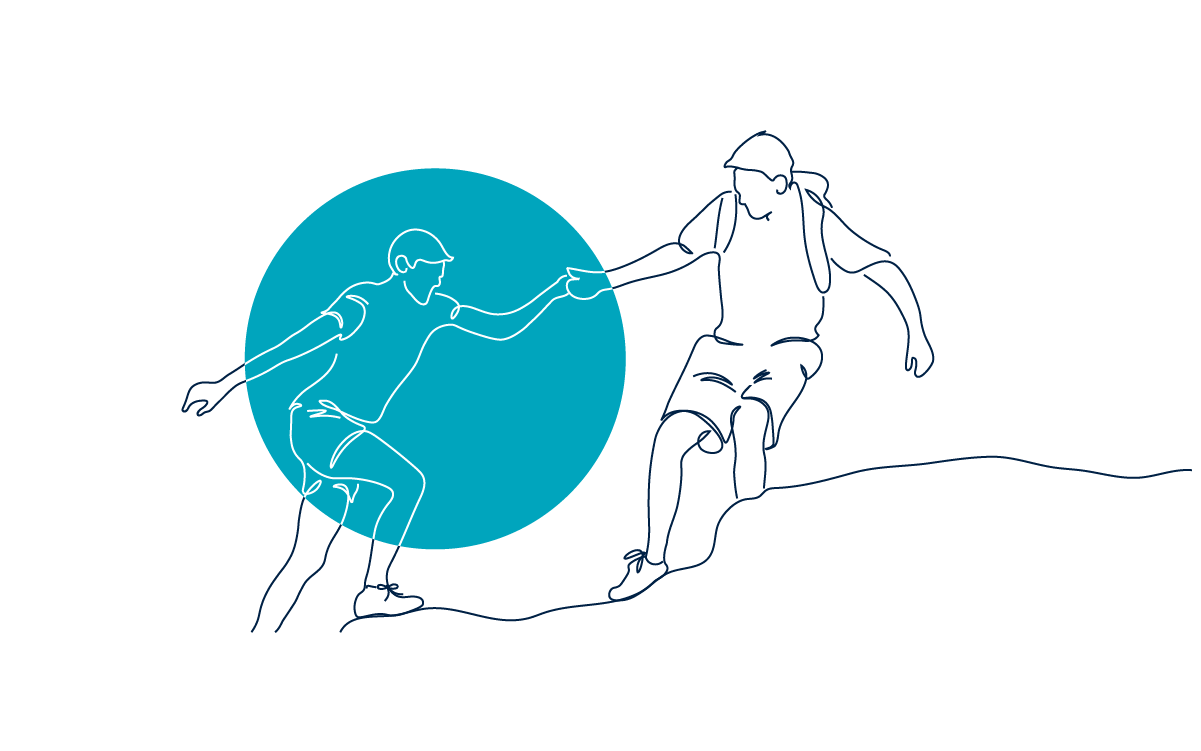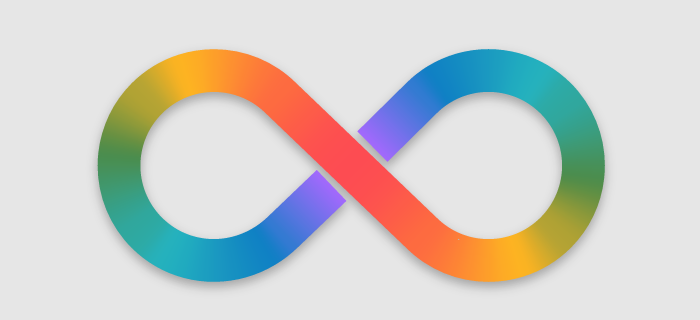
Accreditation
Updates
Jan 2026: Update coming to "Accredited by UBC CPD" logo
UBC CPD is retiring the "Accredited by UBC CPD " logo to clarify accountability of programs developed by UBC CPD. The main branding of any accredited CPD activity must be that of the physician organization accountable (ie. develops content and manages finances). Accountability of the accreditation of a program is contained in the accreditation statement issued upon approval.
Sept 2025: Evaluation questions revised
The required evaluation questions have been recently revised - the changes are as follows:
- fewer required questions
- the wording of the bias question has options for other types of bias
- Mainpro+ programs need to ask about confidence in achieving learning objectives
- MOC programs need to include a CanMEDS question
Sept 2025: Transparency of AI Use
The AI-transparency requirements are to a) convey to participants when AI is used, and b) ensure a human expert reviews any AI-assisted educational materials.
The following two college-issued AI requirements have been added to the application form:
New! "Program providers must disclose to participants when and where artificial intelligence (AI) tools are used in content creation and how the content was reviewed for accuracy."
New! "If AI-generated content is used it must be reviewed for equity and accuracy and mitigation of any AI introduced bias. A human expert must review any AI-assisted educational materials."
Aug 2025: UBC CPD Disclosure Form revised
The purpose of the disclosure form is to eliminate potential conflicts of interest prior to the activity so that accredited CPD is not used as a promotional platform.
The UBC CPD disclosure form has been revised for clarity, specifically the need to disclose business ownership and/or employee of a for-profit company:
• Instructions wording for what to disclose now includes specifically "If you are a business owner or company employee...”
• Added “including as an employee or owner” in the statements
• Table is now A through F, where E is allows for disclosure of "Owner or employee of a for-profit business”
Dec 2024: MOC Section 3 credits reduced to 1 year
Due to an increase in requests for program changes post-approval, the accreditation period for MOC Section 3 credits will be reduced to 1 year to match that of the other credit types. This will also allow programs with both MOC and Mainpro+ credits to more easily track their accreditation.
Dec 2024: New fees in effect Jan 2 2025
As noted in the May 2024 update, the Royal College and the CFPC are in the process of changing their CPD credit frameworks and learning platforms. Accreditation fees will be revised in December to reflect these changes as well as to recover the costs to provide accreditation services.
Here is a preview of the new fees:
| Credit Type | Fees | ||
| MOC credits | $695 | ||
| Mainpro+ credits | $695 | ||
| MOC & Mainpro+ | $1390 | ||
| ADD-ONS: | |||
| Commercially supported programs | $1,000 | ||
| Rush Fee (10 to 15 working days prior) | $750 | ||
| Rush Fee (15 to 20 working days prior) | $500 | ||
NOTE: Applications received less than 10 business days prior to start date are not accepted.
Dec 2024: New CFPC standards launch Dec 16 2024
The new CFPC standards will be in effect as of December 16, 2024. More information will be added to the UBC CPD website soon.
In a nutshell, learning formats will generally map onto the new Mainpro+ credits as follows:
- Group Learning --> Mainpro+ Certified activity / MOC Section 1
- eLearning --> Mainpro+ Certified activity / MOC Section 3 SAP
- Simulation --> Mainpro+ Certified activity / MOC Section 3 SIM
- New CFPC definition for practice assessment for FPs --> Mainpro+ Certified Assessment activity
View more details in our handy All Credits 2025 conversion grid!
Dec 2024: Switch to online application platform only - no more PDFs
As of Dec 16 2024, our online application system (Blitzen) will be used exclusively for all accreditation applications. This revision reflects the changes to the CFPC standards and Mainpro+ credit types.
The option to submit PDF applications via email will be discontinued.
Aug 2024: Plan to sunset PDF application forms
UBC CPD plans to sunset the PDF option for accreditation applications, and move completely to an the online application platform. Details to follow.
Aug 2024: Fee update postponed to December
As noted in the May 2024 update, the Royal College and the CFPC are in the process of changing their CPD credit frameworks and learning platforms. Accreditation fees will be revised in December to reflect these changes as well as to recover the costs to provide accreditation services.
Here is a preview of the new fees:
| Credit Type | Fees | ||
| MOC credits | $695 | ||
| Mainpro+ credits | $695 | ||
| MOC & Mainpro+ | $1390 | ||
| ADD-ONS: | |||
| Commercially supported programs | $1,000 | ||
| Rush Fee (10 to 15 working days prior) | $750 | ||
| Rush Fee (15 to 20 working days prior) | $500 | ||
NOTE: Applications received less than 10 business days prior to start date are not accepted.
July 2024: Sponsorship Agreement has been updated
The sponsorship agreement must state that SPC has full control over program decisions, and sponsorship requires adherence to National Standard. See 2024 Sponsorship Agreement (sample)
May 2024: Changes coming to CPD credit frameworks
The credit frameworks and learning platforms of both the Royal College and the CFPC are changing in 2024-25, which will provide new options for physicians to self-claim credits.
Please consult your college for the latest updates:
Royal College: Changes to MOC expected June 2024
CFPC: Changes to Mainpro+ expected December 2024
Note the formal credit types currently available from UBC CPD (MOC Section 1, MOC Section 3 and Mainpro+) may receive minor tweaks, but will not be majorly altered from the currently available learning formats. Our application forms and resources will be updated as we receive information, with sufficient notice to provide minimal disruption to your programs and the accreditation process.
March 2024: Expedited fee increase coming this summer [postponed to December]
Please note that as of July 2024 the expedited fees will be increasing. In order for us to provide the timeliest service - and for you to avoid the additional fees - please plan to apply early eg. 2-3 months ahead of program start date. See fees.
Feb 2024: New UBC CPD Ethical Standards released with revised resources
The UBC CPD Ethical Standards Accredited CPD Activities 2024 replaces the UBC CPD Guidelines for Support of Accredited CPD Activities 2020. Both are based on the National Standard - the ethical standard that was jointly developed by the two national medical colleges in 2018 for CACME accredited CPD-providers.
Changes to the 2024 version include clearer language around accountability structure and content validity, and a step-by-step guide on how to review disclosures for conflicts of interest (COI). The COI Disclosure Form has been revised accordingly.
An updated Application Form 2024 is also available which includes all credits types - now all-in-one!
June 2023: New payment platform
See Fees.
October 2022: Eligibility of CPD formats clarified
UBC CPD can provide credits for either group learning or assessment programs. See Learning Formats
June 2021: Virtual sponsorship
Virtual Sponsorship - notes from meeting with Royal College and CFPC.
March 2021: Mainpro+ assessment credits
Mainpro+ Assessment credits are for activities that require the learner to review of and reflect on practice data relative to previously established standards, protocols, or norms (e.g., reviewing the treatment and management of patients with diabetes against the latest Diabetes Canada guidelines).
This is in addition to the requirement for an objective assessment of the learner's knowledge or performance (with which is the requirement for MOC Section 3 Assessment credits)
Sept 2020: Revised Ethical Support Guidelines
The revised UBC CPD Guidelines for Support 2020 are based on the National Standard for Support of Accredited CPD Activities released jointly by the Royal College of Physicians and Surgeons of Canada (RCPSC) and the College of Family Physicians of Canada (CFPC) in January 2018.
Note that these are also the ethical standards for ALL programs, as the first three elements apply regardless of whether or not a program has commercial sponsorship. The requirements for physician organization, scientific planning committee (SPC), control of content, financial accountability, and COI disclosures are covered in:
Element 1: Independence (from undue influences)
Element 2: Content Development
Element 3: Conflict of Interest
April 2020: Migrate from F2F programs to online
If you already have group learning credits for your program, you have a few options for moving to virtual.
For the same credits to still work, group learning can be:
1. Group Learning (synchronous) credits. Same interactivity as live events, whereby participants can interact in real time as if they were in the room (asking questions, hearing responses and other’s questions, etc.) eg. webinar. No change to existing group learning credits, except possible decrease in amount of credit time.
2. Group Learning (asynchronous) credits. Participants need opportunity to interact with instructors, each other, and materials, but not necessarily in real time. Program would need to have some interactive opportunity for learners eg. monitored discussion board that closes after limited time. (Note: for Mainpro+ credits the discussion board needs to be summarized at the end).
If you want to rework the material and reapply for different credit type, the program could be eligible for:
3. Assessment credits (eg. online modules). Participants need to be able to interact with the material and instructor and course needs to assess learner’s knowledge, via post test or quizzes. (No group interactivity required.) Program would need to meet the additional criteria of having a knowledge test for the users that includes:
• Correct and incorrect answers, plus explanations of why they are correct/incorrect
• A scored assessment
• Suggested further resources for more information
Requires an MOC Section 3 Assessment and/or Mainpro+ Assessment application.
Or you could choose to not offer credits:
4. Self-learning credits (informal learning). This is when the material stays online without assessment or group learning. This is called “archived material” and cannot be formally accredited. Users can claim self-learning anytime but no certificate is issued. They login to their College’s learning management system and follow the instructions in the learning portal there. See self-learning credits available for specialists and family physicians: ubccpd.ca/accreditation/self-learning
March 2020: Accreditation during COVID-19
The UBC CPD Accreditation Office is open and operational! Working remotely, our team continues to offer full accreditation services, helping to postpone or transfer CPD credits from live to online, and extending accreditation periods through the Colleges so that credits are not lost before they can be used.
We are available to answer your questions by email and meet with you virtually via Zoom and other communication tools.


